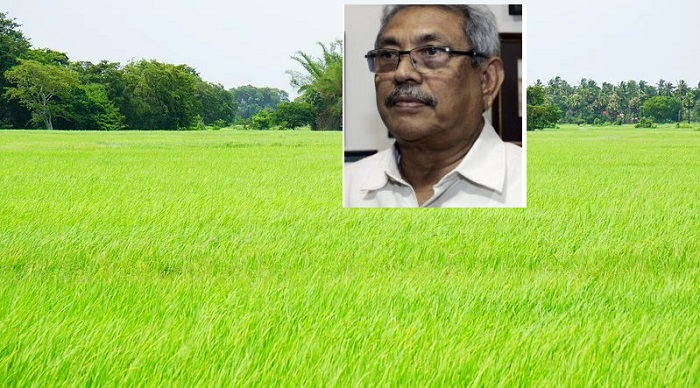
By James Douglas Crickton
The Sri Lankan government’s ambitious plans to become the world’s first completely organic farming nation, triggered a food crisis in the island nation. The developments on organic farming put the Rajapaksa government in a tight spot. So much so the government had to breach its own ban and import from Lithuania 30,000 tonnes of potassium chloride.
The government’s decision to complete shift from chemical to organic farming in April was not well received by political parties, farmers, and tea plantation owners. The decision also led a row between China and Sri Lanka.
It was a sudden decision that had also put a ban import of chemical fertilisers, and paved way for use domestic bio-fertilizers. The decision was believed to be a means to cushion Sri Lanka’s dwindling foreign reserves, which have taken a hit in the light of the Covid-19 pandemic. It was expected to save the government around 400 million US dollars.
The move led to soaring food prices and protests by farmers, who complained that they didn’t have time to make a switch. For instance, prices of sugar, rice and onions soared over twice, with sugar even touching record Sri Lankan Rupees (Rs) 200/kg; and kerosene oil and cooking gas prices also surged. Agriculturists feared that production of export crops like cinnamon, pepper, rubber, cardamom, cloves, nutmeg, betel leaves, cocoa, and vanilla would be hit.
The spiraling prices compelled the Rajapaksa government to allow imports of organic fertilizers in absence of resources and capacity to produce as much organic fertilizer as its agricultural sector requires. Plantations Minister Ramesh Pathirana clarified that the change was to help growers of Ceylon tea, exports of which are worth 1.3billion US dollars annually for the island nation. He said imports of chemical fertilizer would continue until the island was able to produce enough organic fertilizer for local needs.
Sri Lanka has always been dependent on chemical fertilizers for cultivation, with the highest dependency in paddy at 94 per cent, followed by tea and rubber at 89 per cent each. At present, the production of organic fertilizers and bio-fertilizers is not much. Only 0.22 million tonnes of compost is produced by both Department of Agriculture-registered producers and municipal councils which is not sufficient to meet the requirements for farming.
Sri Lanka allocated 3.8 billion US dollars for organic fertilizer purchase in August by importing certain nutrients. The Agriculture Ministry selected China’s Qingdao Seawin Biotech Group Co. Ltd through open bidding to supply organic fertilizer.
The government decided to import 99,000 metric tonnes of organic fertilizer at a cost of 63 million US dollars from the Chinese company. However, the consignment was rejected after an analysis reportedly found it to be “tainted”. China became furious at the rejection.
In two samples, the Sri Lanka Standard Institutions as also National Plant Quarantine Service and Sri Lanka Atomic Energy Board found micro-organisms, pathogens, and diseases harmful to the soil, plants, and humans.
In fact, Sri Lankan scientists put their foot down, warning that China’s organic fertilizer would be an agricultural disaster as the samples were found to be infected with Erwinia, a notorious plant pathogen that causes severe post-harvest losses in crops.
China’s pressure on Sri Lankan leadership did not work. After rejection of the consignment this month, China announced blacklisting of state-owned People’s Bank of Sri Lanka, citing a “vicious” Letter of Credit “default”. China said that the Sri Lankan bank’s decision caused huge losses, but the bank clarified that it was only following court orders prohibiting it from making payments.
Following the row with China over fertilizer issue, the Sri Lankan government has been caught between the friendly country and its farmers who are still reluctant to switch over to organic farming.
While on one hand China has been putting pressure on Colombo to accept its consignment, people of Sri Lanka, on the other hand, are dead against the Chinese fertilizer.
An editorial in Daily Mirror asked the government to be watchful while importing organic fertilizer. Writing under the heading, “Is shifting to organic fertilizer unthinkable?”, the editorial (Oct 29, 2021) noted that the latest shipment of fertilizer from China was returned because it didn’t meet the specified safety standards.
“This is a country which once imported petrol that was harmful and below standard, exposing vehicles to great danger. The government had to compensate scores of vehicle owners because the low-quality petrol clogged petrol pumps and stalled machines on the roads. It’s important for the government to think of people’s safety when importing fertilizer from a country like China because fingers are pointed at this nation for engaging in ‘biological warfare’ to boost business interest and enhance its chances of being the superpower in the world,” the Daily Mirror warned.
It is good that President Gotabhaya Rajapaksa is engaging farmers with grievances in conversation. Farmers facing problems associated with fertilizer in districts like Badulla and Puttalam have already aired their concerns to the President, according to reports.
From all accounts China is not willing to accept that Sri Lanka has disallowed a consignment of organic fertilizer exported by a Chinese company. Beijing is said to be using pressure tactics to have its way with Colombo. Naturally, all eyes are on the Rajapaksa government to see how well it handles the fertilizer fiasco by friendly China. (Poreg)
